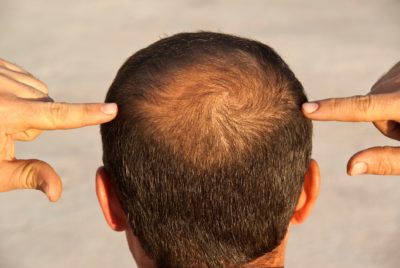The short answer is “Yes, but not always.”
Hair thinning and loss can be triggered by several other factors, as well, including heredity, hormonal changes, physical and emotional trauma, sudden weight loss, and certain medications.
including heredity, hormonal changes, physical and emotional trauma, sudden weight loss, and certain medications.
Various physical stressors can trigger a type of hair loss called Telogen Effluvium, where growing hair follicles go into their resting phase prematurely. Because telogen hair rests in the follicle for 2 to 3 months before being shed, it’s normal to not notice any significant changes until 2 to 3 months after the illness, major surgery, or serious infection that triggered the loss. You may also notice some loss of overall volume. For most people, hair will regrow over the next 6 to 12 months, provided the illness that precipitated hair loss is gone.
Does everyone experience hair loss after illness?
Some people may not be affected at all, some will notice drastic hair thinning or loss, while others will notice only subtle changes. It is not clear why some folks are more affected than others. Hair growth is a dynamic process that depends on biology, nutrition, lifestyle, and more. Plus, one’s reaction to an illness may be vastly different from another. One such example is when the health or growth of fingernails and
toenails become impaired due to illness, leading to a visible furrow across the nail.
What can I do?
If hair thinning or loss coincides with the onset of an illness, you may not need to see your physician if the symptoms are mild and barely noticeable. If, however, you experience significant thinning or loss and you’re unsure of the cause, consult your primary care doctor before waiting to see if conditions worsen.
Deficiencies of certain vitamins and minerals can slow down the hair regrowth process, so make sure to adopt a balanced, nutritious diet and consult your health professional before turning to supplements. A simple blood test can pinpoint any deficiencies.
Hair loss from any cause is cause for emotional concern, at the least. Here at DiStefano Hair Restoration, we urge you not to suffer in silence. Instead, contact us to discover if there’s a transplant option that restore your full head of hair, and when such a procedure might take place, especially in the wake of an illness. Your up-front consultation is free, so why not schedule your appointment today.


